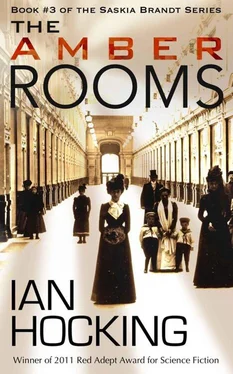‘No. The system is the invention of Pingala, an Indian scholar who died several centuries before Christ.’ She paused. ‘If the binary notation is standard, then the number represented is large. I received the first number in the autumn of last year; the second I received slightly afterwards. Those two occasions gave me reason to understand what the large number represents.’
Saskia backed away.
‘What does it represent?’ Pasha stage-whispered.
‘Simply the time, in seconds, until a particular date.’
‘When?’ Pasha asked in Russian. Then, noting Saskia’s silence, he said in English, ‘What will happen?’
‘I have to leave.’
Saskia opened the door.
‘Who sent the message? Where do you need to go?’
‘Shhh,’ she said. ‘Good night.’
‘Good night.’ Pasha lay flat and put his hands against the back of his head. ‘Please, don’t tell Mother about my dream.’
‘Of course, Pavel Eduardovitch. Likewise, don’t tell her about my band, please.’
‘You may call me Pasha.’
She held her arm as she left his room. The band felt cool. She had no idea why it had reacted to the boy. Its influence typically told on systems with chaotic properties. What was different about his brain? Was it linked to his epilepsy? Perhaps it would have reacted in such a way to anybody, had Saskia permitted another person to touch it. But why had she allowed Pasha? As if in answer, she heard, once more, the song. This time it was the idling of her memory.
As she closed Pasha’s door, she heard a squeaking hinge at the end of the corridor. She turned. The door to the master bedroom closed with a gentle click.
She returned to her room and took a heavy blanket from a chest. She threw this across the bed and climbed inside.
Immediately, she knew that there was something in the bed with her. She rolled out, pulled back the bed clothes and pawed once at the switch for the electrified chandelier. The room exploded with light.
She released her breath. There was crumpled note at the base of her pillow.
Ms Tucholsky,
I would be obliged if you were to accompany my son to the Tsar’s Village tomorrow morning for a tour, which forms part of our small efforts in the furtherance of his education. I do, of course, remain,
Yours, Count Nakhimov
The next morning, a maid knocked at the door and entered with brass cans of hot and cold water. Sleepily, Saskia introduced herself, but the maid said little and left. Saskia slid from her bed and performed several sets of push-ups, squats and sit-ups. Then she put her forehead against her shins and slowed her breathing. She wondered if she could avoid taking Pasha to the Summer Palace that morning. She was not safe in St Petersburg and she did not trust the judgement of the Count. However, if the Count’s connections were using him, they would not wish to harm his son.
Saskia stood tall and closed her eyes. The traffic noise was loud. She considered the Monty Hall Problem of counter-intuitive probability, both as a method of emptying her mind and as a mathematics lesson for Pasha should the need arise.
When the maid returned with tea, pancakes, sour cream, hot kasha porridge and the Gazette, Saskia was fully dressed. Her right hand gripped her left wrist within the warmer. She waited for the maid to leave. Then she discarded the warmer to sip the tea. It was black and excellent.
In the Gazette, she could find no mention of Kamo being discovered on the train. Her eyes lingered on the date. The day to come, the 17th May, 1908, might be her last in this time. What would it be like to skip those coming decades? She already knew: physically, it would be as mundane as passing from one room into another. Tomorrow might see her reconnected. The future was home, and that was enough, but Saskia planned to rescue her friend David Proctor from whatever had befallen him. The plan was impossible without paradox, maybe, but she would try.
She looked at herself in the mirror and adjusted her frilly cuffs and collar. The impression of the outfit was appropriate to her role as tutor: a sensible, dark affair with an embroidered blouse. The Countess had provided a choice of three hats, each belonging to a previous tutor. They had been adjusted to accommodate Saskia’s head. She was glad that the fashion for wide, tall hats was fading. She was quite tall enough. She opted for a narrow, flat hat with two trailing ribbons.
Saskia smiled at the woman in the mirror; not her.
The circle is closing.
~
Saskia and Pasha walked alone towards Tsar’s Village Station. It was mid-morning and some of the urgency had left the streets. The day was light but chill. Pasha, who had wanted to take a coach, was sullen.
‘What happened to your previous tutor?’ asked Saskia, watching a horse bus. ‘Did she resign on account of your extended silences?’
The boy said nothing.
‘Come,’ said Saskia. ‘If you talk to me, I’ll buy you a lollipop.’
‘I’m not a child.’
‘Clearly. A child would lack the energy to keep up such a miserable façade. Your adult qualities are almost fully developed, I’m sorry to say.’
Pasha frowned over her words. ‘“Miserable”?’
‘Убогий.’
‘I’m not miserable. I’m tired.’
‘Don’t be ridiculous. We’ve been walking less than ten minutes.’
‘Why are you so fit? Did you used to be an athlete?’
‘Did you use to be.’
‘ Use to be.’
‘But, Pavel Eduardovitch, how rude of you to use the past habitual, and with a stative verb, for shame. I’m still an athlete. Present continuous.’
‘Prove it. Run and find us a taxi.’ Pasha took a cigarette from his waistcoat and gave her a sardonic smile. ‘Imperative.’
As he placed the cigarette in his mouth and patted himself for a matchbook, he noticed that Saskia was no longer beside him. He looked back. She had stopped under the awning of a jeweller’s shop. She was not, however, looking at the window. She was looking at him. He sighed and walked back to her.
‘I’m sorry, Ms Tucholsky. I didn’t mean to be rude.’
Without taking her eyes from his, Saskia drew her leg to the level of his face and swatted the cigarette from his mouth with the tip of her boot. She held her leg at this startling angle for a moment longer. Then she dropped it and, once more, she was just another window shopping lady. Her umbrella had never left the crook of her elbow. She adjusted her hat.
‘Imperative is mood,’ she said, ‘not tense. Now pick up your feet or we’ll miss the train.’
Pasha’s mouth still pouted around the missing cigarette. ‘What?’
‘The train.’
‘No, not the train. How did you do that?’
‘Yes, the train. Pasha?’
‘What?’
‘The word you’re looking for is “pardon”. Look, you dropped your cigarette. Pick it up and place it in a bin, please.’
By the time Pasha had found the cigarette and given it to a drunkard, Saskia had vanished. He looked up and down the street until her voice called from far away. She was riding the rear of a trolleycar. Pasha rushed into the traffic. He swerved around a coach and horses and intercepted the trolleycar on the corner, as it slowed. Saskia helped him onto the deck.
‘Well done,’ she said. ‘Athletic, even.’
‘I can’t breathe.’
‘Lean forward, if you must. Let your lungs inflate.’
Pasha’s bloated face stared up at her. ‘I think I deserve that lollipop now.’
~
On the train to the Tsar’s Village, once a grand Swedish estate, Saskia and Pasha ate blini sandwiches and a cold meat salad. They occupied a small but comfortable private booth. It seemed that Pasha had been told by his father to demonstrate his knowledge of local history, so Saskia had listened to a collection of facts and anecdotes about the Village.
Читать дальше












